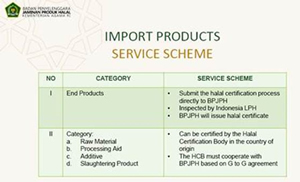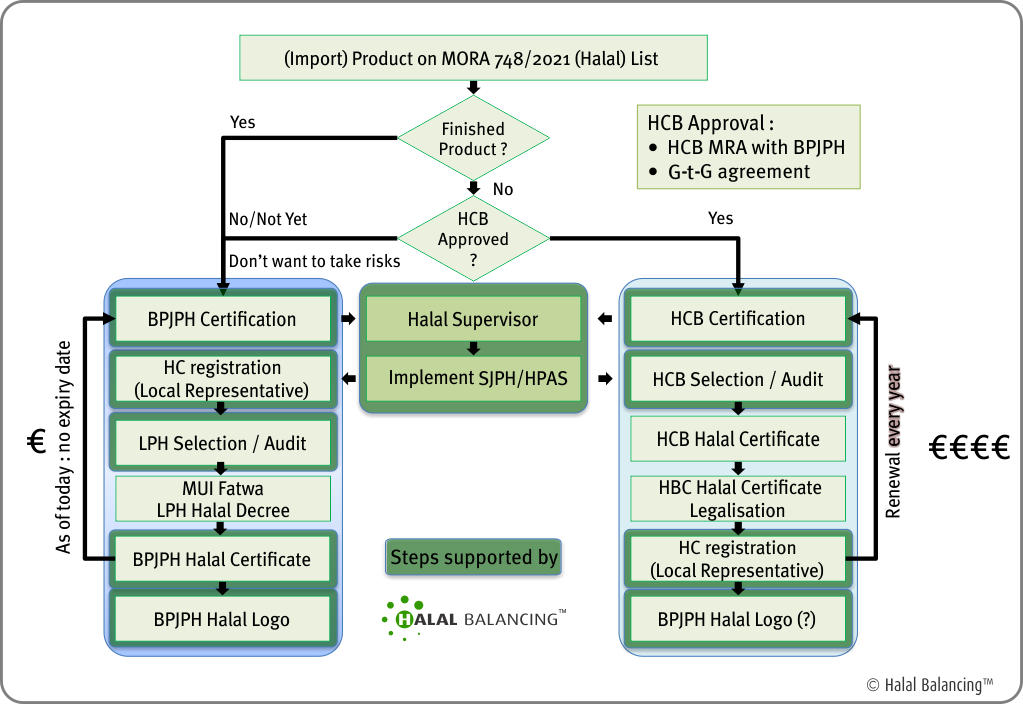- Services
- •
- Experience
- •
- Us
- •
- Archive
- •
- Contact
Combine International Halal Expertise with European Operational Excellence
As Halal requirements differ across the globe, so do Halal standards or Halal schemes. Knowing which Halal standard or scheme to follow may be crucial for success.
PI100H.png)
![]() In Europe, in absence of official Halal Authorities, Halal Certifier Bodies develop their own Halal Standards, reflecting their own beliefs and those of their targeted Muslim consumers.
In Europe, in absence of official Halal Authorities, Halal Certifier Bodies develop their own Halal Standards, reflecting their own beliefs and those of their targeted Muslim consumers.
Our HAS Plug In® methodology allows seemless integration of various Halal Certifier Halal schemes into the existing documentation system. We also help companies determine which certifier to use, see also our Halal Certifier Selection Service.
When exporting outside of Europe, not all European Halal Certifiers as accepted as such by the importing country. Some countries established (closed) lists of approved Halal Certification Bodies - only Halal certificates of these Halal Certifiers are accepted by the importing country.
![]() Also in this case, we help companies to to determine which certifier to work with and which country specific Halal requirements will have to be met and how to setup the Halal Assurance System. See also our Halal Certifier Selection Service.
Also in this case, we help companies to to determine which certifier to work with and which country specific Halal requirements will have to be met and how to setup the Halal Assurance System. See also our Halal Certifier Selection Service.

Sometimes countries have very specific regulations, resulting in a more complex Halal certification process, either by local Halal Certification Bodies or by direct Halal certification of the importing country. Leveraging our knowledge on Halal requirements and Halal Assurance System implementation, we also offer more extensive help in getting products 'fit for (Halal) export'.
 LPPOM MUI (previous Halal authority)
LPPOM MUI (previous Halal authority)Until 17.10.2019 LPPOM MUI was the sole Indonesian Halal certification body.
As part of the Halal certification process of Indonesian companies, LPPOM MUI had to screen ingredients for Halal compliance. For non Indonesian companies, Halal certificates were accepted as proof of Halal as long as the Halal Certification Body was approved by LPPOM MUI. Non Indonesian companies certified by such LPPOM MUI approved Halal Certification Bodies were allowed to export their products to Indonesia, to be used as ingredients or to be sold in the food service channel.
To sell Halal products directly to the final consumer, the MUI Halal logo must be used. To use the logo, a company had to be directly certified by LPPOM MUI, using the HAS23000 standard as a reference.
As Halal Balancing, we support(ed) certification by a LPPOM MUI approved local Halal Certification Body and the direct certification by LPPOM MUI. We are LPPOM MUI certified as HAS23000 internal trainer and HAS 23000 internal auditor.
 BPJPH (new Halal authority)
BPJPH (new Halal authority)With the Indonesian Halal law 33/2014 (Halal Product Assurance), entering into force in 17.10.2019, products imported, distributed and sold as Halal in Indonesia must be mandatory certified Halal, or they will have to be labelled as Haram. This law is not limited to food products but covers cosmetic and pharmaceutical products as well.
Subsequent regulations further refined the implementation :
One of the big changes under the new system is the creation of an Indonesian government agency (Halal Product Guarantee Agency/Badan Penyelenggara Jaminan Produk Halal : BPJPH) to oversee the entire Halal product assurance system. BPJPH still relies on MUI itself to issue the fatwa's for the certification of Halal products. LPPOM MUI is no longer certifying Halal products, under the new scheme they become a BPJPH approved Halal audit company (LPH).
 Source : 2021 BPJPH presentation
Source : 2021 BPJPH presentation
Not only is Halal certification becoming mandatory to avoid labelling products as Haram, finished products are to be certified directly through BPJPH rather than being accepted based on mutual recognition of (foreign) Halal certificates. This may be different than current practice where products sold in foodservice are exempt from direct Halal certification.
Also recognition of foreign Halal Certifying Bodies (HCB) may become more difficult as, amongst other :
Furthermore, notarised Halal certificates from national HCB's still have to be registered (by an Indonesian company) with BPJPH.
With implementation deadlines approaching (grace period for food ending 17.10.2024) and mandatory Halal certification for medicines and cosmetics started on 17.10.21, with the grace period ending on 17.10.2026, uncertainty grows and direct Halal Certification by BPJPH more and more becomes a viable alternative for securing and maintaining Indonesian market access :
Summarised :

![]() Anticipating these evolutions and capitalising on its past experience with Halal certification in Indonesia,
Anticipating these evolutions and capitalising on its past experience with Halal certification in Indonesia, ![]() offers complete BPJPH Halal certification support:
offers complete BPJPH Halal certification support:
Note that BPJPH Halal Certification is a two step process : accepting/certifying the SJPH Halal Assurance System and then certify the products produced using this approved Halal Assurance System.
Setting up a BPJPH compliant Halal Product Assurance System requires quite some preparation, so it is advised to start setting up the HPAS well ahead of the application for certification. Also audits are more in-depth than the audits most companies are used to.
The standard HAS Plug In® program has been adapted to include BPJPH specific requirements (HAS Plug In®, HAS 23000 version).
Halal Balancing is a certified Halal Supervisor & Halal Auditor, having the knowledge to implement the required Halal Product Assurance System requirements and how to manage the audits.
![]() Our Halal Feasibility Screening program™ can be used to assess the existing Halal Assurance System for BPJPH HPAS compliance and audit compliance, as BPJPH compliant audits usually differ from standard Halal audits of local Halal certifiation bodies.
Our Halal Feasibility Screening program™ can be used to assess the existing Halal Assurance System for BPJPH HPAS compliance and audit compliance, as BPJPH compliant audits usually differ from standard Halal audits of local Halal certifiation bodies.
 Entering in force in 2017, the new UAE Halal scheme changed the way Halal Certification Bodies were accredited and how companies are audited. New in these standards is the two-stage audit, comprising both Halal and Food Safety.
Entering in force in 2017, the new UAE Halal scheme changed the way Halal Certification Bodies were accredited and how companies are audited. New in these standards is the two-stage audit, comprising both Halal and Food Safety.
Based on the ISO 17021-17065 series, more attention has been given to Certifier impartiality (only auditing) and overall documented competency.
We are EIAC-trained and SMICC certified for this scheme and hence support and assist companies in getting certified according to this new scheme.

 As GSO (Standardisation Authority of the Gulf States) and SMICC (Standardisation Authority of the OIC countries) follow similar standards, we also support these schemes.
As GSO (Standardisation Authority of the Gulf States) and SMICC (Standardisation Authority of the OIC countries) follow similar standards, we also support these schemes.
UAE.S 2055-1:2015: Halal products - Part 1: General Requirements for Halal Food
UAE.S 2055-2:2016: Halal products - Part 2: General Requirements for Halal Certification Bodies
UAE.S 2055-4:2014: Halal Products - Part 4: Requirements for Cosmetics and Personal care
UAE.S 993:2015: Animal Slaughtering Requirements According to Islamic Rules
OIC-SMICC-1 : Halal Food Production
OIC-SMICC-4 : Halal Cosmetics
OIC-SMICC-9 : Halal Tourism Services
 Malaysia always has been on the front of the development of Halal standards and has a formalised Halal Certification Procedure and an official Halal Authority (JAKIM).
Malaysia always has been on the front of the development of Halal standards and has a formalised Halal Certification Procedure and an official Halal Authority (JAKIM).
![]() has a long lasting experience of preparing companies for either direct or indirect certification.
has a long lasting experience of preparing companies for either direct or indirect certification.
For slaughterhouses or meat producers, direct certification by JAKIM (and the veterinary department DVS) is a requirement for export to Malaysia.
For most other products, certification by a local Jakim approved Halal Certifier is sufficient (indirect certification), but also 'direct' certification by JAKIM, allowing producers to carry the Jakim logo, is an option.
We support all schemes (direct and indirect; meat and non-meat), including application follow up. We're also a Jakim Halal Board Professional certified Halal Executive.